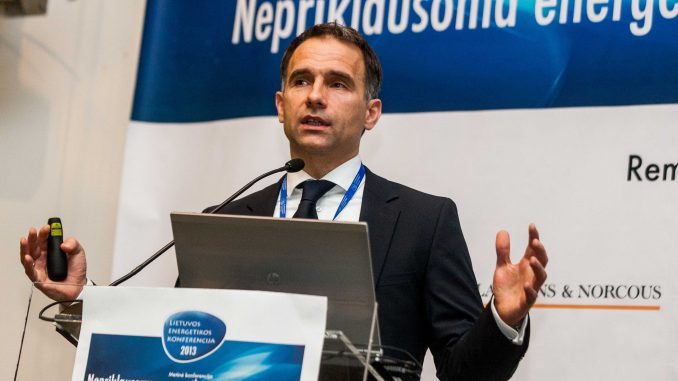
“Since the party and I share the same principles, this is a very responsible offer. If people have confidence in you and believe that you can do more, then you have to accept such offers,” Masiulis, who has never had any significant links with the Labour Party, told DELFI.
The energy sector must be “strong, independent and transparent,” he said.
The 45-year-old minister-designate plans to focus a lot on Klaipėdos Nafta and its liquefied natural gas (LNG) terminal project.
“My key task now will be to ensure smooth operations of Klaipėdos Nafta,” he said.
Masiulis will be sworn in on Thursday and will immediately take up his new post.
Gitanas Nausėda, an adviser to the president of SEB Bankas, Lithuania’s biggest bank by assets, welcomed the appointment, saying that Masiulis is a professional who has proven that he has the backbone to defend his projects.
“I am really impressed by his competence and decency, and managerial skills,” he told BNS.
Apart from Klaipėdos Nafta, the Energy Ministry also controls the electricity transmission system operator Litgrid through the holding company Epso-G.
President’s hand
President Dalia Grybauskaitė had a hand in appointing Masiulis to head the Energy Ministry, says political scientist Ramūnas Vilpišauskas, director of the International Relations and Political Science Institute at Vilnius University.
“This appointment shows the president had major influence on choosing the candidate. I believe it was mainly her decision, although, I think, it was also undoubtedly coordinated with the prime minister. The Labour Party, in this case, decided not to resist, hoping that it might probably be beneficial for them in the future,” the political scientist told BNS on Monday.
According Vilpišauskas, the choice does not seem strange as Masiulis has necessary qualifications and competence in the sphere of energy as well as management experience.
The expert believes the new minister should actively work on all key energy projects but the recent fiasco with shale gas exploration tender and Chevron’s exit shows that not everything depends on the minister.
“Speaking about such projects as the construction of the Visaginas nuclear power plant, its progress will also depend on the ruling coalition and its internal agreement on the issue. In this case, the minister will have a secondary role in where political decisions need to be made. But where decisions have already been made, let’s say, the power link with Sweden and Poland, where constant supervision is needed for work to be done in time, here, I think, the minister will have a bigger role and will pay proper attention,” Vilpišauskas said.
He underlines that Masiulis’ previous activities give no reason to suspect that he might be linked to interest groups that are very active in the energy sector. However, he adds, the minister will have to withstand pressures from both the business sector and the Labour Party.
“The key question is how the minister himself will be able to withstand influence, as well as the Labour Party’s wishes. Since formally the position belongs to the Labour Party, just like previously it belonged to the Electoral Action of Poles in Lithuania (LLRA). We saw that towards the end of his work, the previous minister seemed to be actively coordinating matters with the LLRA. So it remains to be seen whether something similar will not happen with this minister,” Vilpišauskas said.
PM: Labour Party’s decision, not president’s
Prime Minister Algirdas Butkevičius says that appointing Masiulis as minister of energy was a decision made by the Labour Party, not the president.
The prime minister said that he talked to Seimas Speaker Loreta Graužinienė from the Labour Party on Friday and they agreed that it would have been good to submit a candidate to the president before she left for her visit to the United States.
“The Labour Party has made this decision after a long discussion, as far as I know. Graužinienė then presented the candidacy to me, which I subsequently discussed with the president and submitted my nomination for her to be able to pass and sign a relevant decree,” the PM said.

Be the first to comment